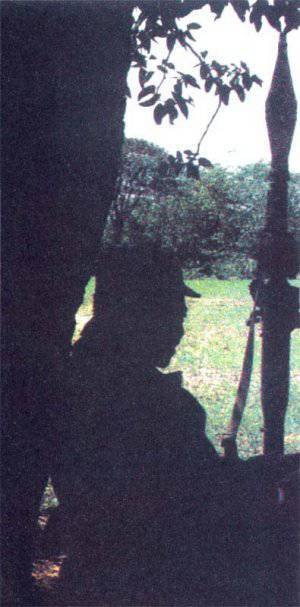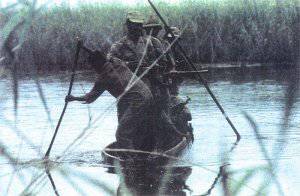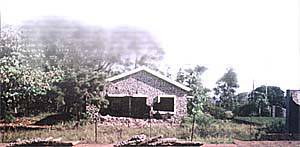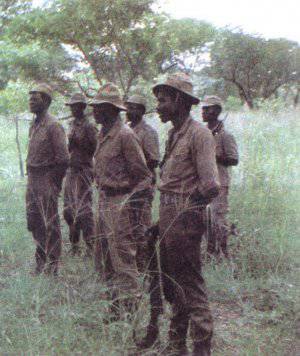African experience for Eurasia and America. South African military operations in Mozambique
ANATOMY OF THE PROBLEM
 In the study of any problem it is necessary to determine the terminology. Otherwise there will be no practical conclusions or benefits. The modern problem of terrorism requires a revision of the established stamps.
In the study of any problem it is necessary to determine the terminology. Otherwise there will be no practical conclusions or benefits. The modern problem of terrorism requires a revision of the established stamps.At first, political terrorism (one should talk about it, the rest is just criminal activity) never locked in its strategic goals and tactical tasks within national territorial boundaries. That is, political terrorism always exists in the "international" space. Moreover, terrorist organizations hide their bank accounts, the top executive is mainly abroad, where they open their offices, buy or receive, as they say, from “sponsors” (special services and political customers) weapon and ammunition. This is a necessary, characteristic and common property of political extremism in the form of sabotage and terrorist activity. If political extremism exists under the auspices of a certain state (s), then this can be classified as a political diversion of one state (s) against another (s). In the postwar stories African states have many such examples. True, they may be known by the legend of the national liberation movement or the struggle against communist totalitarianism.
Secondly, the combat formations of extremists cannot long exist without external support. This is a long-proven fact.
Thirdly, practically no extremist movement can do without the participation of foreign citizens in it as specialists, volunteer fighters, hired adventurers, observers - sympathetic states and political organizations.
By the way, some military specialists of the Soviet Union who have been on a long foreign business trip call themselves mercenaries or compare themselves with them. Harmful delusion. A military specialist is guided by the laws of his country and country of residence, the terms of a contract or contract signed between governments under international law. He performs a duty of duty and is protected by law, international law. A mercenary makes a private contract deal with a recruiter and, as a rule, acts against a legitimate government, unlawfully. Mercenary is prohibited by international legal acts and in some states is prosecuted. The French Foreign Legion, often mentioned in the press, is under the jurisdiction of the French state and belongs to the category of mercenary armies. Cadre military or civilians secretly commanded by special services to help the rebels do not belong to mercenaries either. Mercenaries are called in Latinized languages by the special term mercenario in contrast to volunteers and soldiers of mercenary armies, respectively, voluntario and conractado. In English, the word mercenary also has a negative meaning.
FourthlyPolitical extremism, including terrorism, demands from its leaders international recognition and high-level political contacts. The amount of foreign aid and the degree of external political support depend on this.
Thus, when we touch on the topic of political extremism, without any reservations we must bear in mind one of its main qualities - transnationality. Modern political scientists have already begun to use the term transnational terrorism instead of the phrase international terrorism. In my opinion, two terms are enough: political terrorism to a broader political extremism within its meaning (in addition to terrorism, this concept also includes political conspiracies, coups, etc.). Political extremism can be classified in other terms reflecting the motives of extremism. For example, separatism, nationalism, religious fundamentalism.
In Russia, and after the events of September 11 in America and around the world, terrorism was talked about as a form of warfare. Many experts are inclined to consider these events as a major political diversion or sabotage and terrorist action of global significance organized against the United States by order of competing transnational financial centers. Indeed, if competitors destroy each other with the help of assassins at the level of individuals, then why cannot this be at the level of competing legal entities and states? Such an action, as is known, takes the form of war or intervention, and now a major sabotage, since with a nuclear power, which has the most powerful fleet and air force, huge financial resources, it is impossible to fight in the usual way. This interpretation of 11 September events changes the whole system of views on anti-terrorism measures and opens up real opportunities for international cooperation in this area.
Main obstacle in the cooperation of states against political extremism is the so-called double standard in the legal definition of political extremism. This applies both to the field of legal norms that recognize the struggle of peoples for their independence as legitimate, and to the definitions of criminal acts against humanity. Therefore, for some, separatists, for example, are fighters for independence and freedom, for others - terrorists. Definitions depend on political conditions, and there are about a hundred definitions of political terrorism in the world. The Americans actively supported Chechen separatists, implanting Wahhabism, unknown in the Islamic part of Russia, until they themselves had trouble and the myth of invulnerability and invincibility of America did not disappear. America, in the face of a new political environment, turned to Russia in anticipation of assistance and recognized the "fighters for the freedom of Chechnya" as terrorists.
Second problem is a blurred classification of political extremism under international law. Unfortunately, among the politicians, the terrorist action itself is still recognized as terrorists, and the executors, the so-called militants, are its terrorists. In fact, political extremism has material, financial and economic roots. In fact, it reflects the crisis of power regulating market, commodity-money relations, or legal crisis, including the crisis of international law, that is, the world order enshrined in legal norms. Religious, nationalistic, racial, and other ideological conflicts are secondary. They reflect or cover up the essence of the political crisis and allow the population to be mobilized as “cannon fodder” to achieve a true political goal, which in the overwhelming majority of cases remains unknown to the population.
In planning anti-terrorism measures (it would be better to say measures to strengthen stability and state or international security) we must conditionally distinguish at least four levels of extremist organization.
First level - the level of political customer, authors of the idea. This is the level of state institutions, large transnational corporations with annual turnover, which is comparable to the budget of medium-sized states, other similar subjects of the conflict. It is at this level that there is a desire to deform the situation in the market in such a way as to strengthen its position and weaken the competitor. If there are no legitimate opportunities to achieve the goal, then resort to extremist actions.
 Second level - the level of implementation of the plan through the creation of a new extremist organization or the revitalization of an old, existing one. For this purpose, experts are involved who own the methodology of political provocations and sabotage and terrorist activities.
Second level - the level of implementation of the plan through the creation of a new extremist organization or the revitalization of an old, existing one. For this purpose, experts are involved who own the methodology of political provocations and sabotage and terrorist activities.Third level - level of financing. This is the key level at which financing and material support schemes are developed, including through local resources and capabilities. At the same level, the activity of extremists is regulated, if necessary, temporary preservation of the organization, expansion of the area of operations or restructuring of the nature of the activity. Financiers are strictly subordinate to the customer. In their hands is the notorious "power tap". To eliminate the extremist movement, it is enough to close the "tap".
Fourth level make up the very same militants who are continuously recruited, recruited from the people. Militants do not know the entire organization and are actually used in the dark for their intended purpose. By the way, the whole structure is known to few, especially dedicated to extremists. I am sure that even Maskhadov does not know the entire structure of the Chechen separatist movement. Hardly knew this and Dudayev. There is a practice when the so-called leaders of extremist organizations tightly control each other's actions in the interests of a political customer, compete and quarrel with each other, being at the mercy of his political intrigues.
Knowing the structure of the extremist movement, its organization, the state plans appropriate protective measures that are effective only in their complex application. Political and administrative measures are aimed at overcoming the crisis of power and restoring the regulatory functions of the state, suppressing foreign support for extremism by political means. Special measures are aimed at eliminating sources of financing and supplying extremists. Troops and police measures are aimed at curbing the actions of extremist military formations and neutralizing them. Information activities weaken the propaganda influence of extremists on the population and public opinion, increase the ideological stability of the population.
This is just a quick look at the problem. Below are three examples of South African military operations against the African National Congress (ANC) in the territory of distant Mozambique. This is not about political sympathies and antipathies, but about the practice of South African army professionals. Operations were conducted during the leadership of the ANC, Oliver Tambo, a few years before the release of Nelson Mandela, the leader of the ANC. This is an example of how military measures, even well-planned and successfully implemented, do not solve the problem. Overcoming the multi-year crisis of power in South Africa took place thanks to political internal and external changes.
REID "IN ANOTHER'S SKIN"
ANC combat cells were located in different countries of the South African region. In essence, these were the militant bases and training camps for the ranchmen functionaries of the Lance of the Nation combat organization, which was part of the ANC. One such base for mid-level managers was located in one of the villas in Ma-tol, the once fashionable suburb of Maputo. From here it was close to the border with South Africa and Swaziland. The villa was located in a well-protected area near the storage of drinking water and the town of Soviet military experts. Until 1st tank the brigade of the Mozabique People's Army (MNA), standing between Matola and the border with South Africa, was about 15 kilometers along the highway. Brigade units guarded important business facilities and bridges.
 The raid of Yuarovsky special forces in the area of the ANK villa took place at night in early May, 1982. About fifty Yuarov citizens came from the location of the 1-th brigade on three GAZ-66 and IFA-50 vehicles made by the GDR. They were dressed in MNA uniforms, armed with small arms and RPG-7 grenade launchers, which were armed with Mozambican units. A column of three cars did not cause anyone suspicion. Arriving at the ANC villa with peacefully sleeping inhabitants, South African special forces dismounted and took up a position to shoot at the villa and positions that blocked the street from both sides. The first, standing in a semicircle, fired grenade throwers. Light walls of sand-cement mixture punched grenades through the entire depth of the house. A minute later the villa was a skeleton with through breaks. Then the fire was opened from machine guns and machine guns. No one in the house survived.
The raid of Yuarovsky special forces in the area of the ANK villa took place at night in early May, 1982. About fifty Yuarov citizens came from the location of the 1-th brigade on three GAZ-66 and IFA-50 vehicles made by the GDR. They were dressed in MNA uniforms, armed with small arms and RPG-7 grenade launchers, which were armed with Mozambican units. A column of three cars did not cause anyone suspicion. Arriving at the ANC villa with peacefully sleeping inhabitants, South African special forces dismounted and took up a position to shoot at the villa and positions that blocked the street from both sides. The first, standing in a semicircle, fired grenade throwers. Light walls of sand-cement mixture punched grenades through the entire depth of the house. A minute later the villa was a skeleton with through breaks. Then the fire was opened from machine guns and machine guns. No one in the house survived.This massacre was suppressed by the sentinel MNA, a veteran of FRELIMO, who guarded the thousand-kilogram water tanks. Realizing that it was not the MNA soldiers who were shooting and something criminal was going on, he opened fire from the PKK machine gun along the street at the shooting saboteurs. Yuarovtsy, responding with fire in the direction of the sentry, quickly got into the cars and drove along the alleys to the safe side, leaving no wounded or dead. After some time, the search groups of the 1 Brigade and the police found cars abandoned by the saboteurs near the border. The saboteurs themselves managed to covertly cross the border in several groups and safely return to the barracks.
It remains to add that such an operation could not have taken place without good reconnaissance and careful study of the details of the plan. The leaders and direct participants of the operation, apparently, visited the place of its conduct during the planning and on the eve of actions.
What made it possible to carry out a raid "in someone else's skin," a special unit of South Africa? There are many reasons, including domestic ones. But miscalculations were also made at the level of the administrative authorities and security forces of Mozambique. Discipline in the border units, in the military units that controlled the roads (we call them roadblocks), was not high. War fatigue, poor nutrition and meager material support affected. Communication units with the command of the province was unstable. There was not enough organized and effective work with the population in the border areas. Therefore, Yuarovo special forces acted for sure, taking into account all objective and subjective factors.
BLOW INTO THE THEME
 About a year later, South African security services held another rally in the capital of Mozambique against the ANC. At this time, the recruitment of service personnel of the hotel, in which the members of this organization were compactly located, was used. The last floor of the hotel was given by the decision of the Mozambican authorities to the ANC group, and the entrance to strangers on this floor was ordered. The floor was guarded.
About a year later, South African security services held another rally in the capital of Mozambique against the ANC. At this time, the recruitment of service personnel of the hotel, in which the members of this organization were compactly located, was used. The last floor of the hotel was given by the decision of the Mozambican authorities to the ANC group, and the entrance to strangers on this floor was ordered. The floor was guarded.A prepared South African agent carried small quantities of explosives into the technical room on the roof, which was located above the ANC group meeting room. When the specified amount of explosives had been accumulated, the agent installed a radio-fuse. During the meeting the group was directed blasting the roof. Most of those in the room died.
The State Security Service of Mozambique responded promptly to this incident. South African agents, including those who provided the main demolition man, were arrested. But the deed was done.
The explosion in the hotel caused a wide resonance in the country's political circles. Supporters of peace negotiations with South Africa demanded that President Zamora Machel expel all ANC members from the country. In this act, they saw the key to resolving the armed conflict between the opposition organization RENAMO and the ruling party FRELIMO. The government of South Africa actively supported the opposition organization in response to the support of the ANC by Mozambique. This was the case when states used secret methods of political struggle, justified, by the way, more by ideological opposition, and not by economic competition between Mozambique and South Africa.
Subsequently, the militants of RENAMO used the “hotel method” more than once to organize sabotage on the well-protected sites of Mozambique.
However, Samora Machel and his supporters still believed that with the help of the Soviet Union they would be able to retain power and stabilize the situation in the country, and continued to support the ANC.
POINT AIRLINE
In May 1984, a major South African military action was again held against ANC groups stationed in Mozambique. This time aviation a group of the South African Air Force, which, according to eyewitnesses, consisted of 8-10 aircraft of the Impala and Mirage 2000 type, attacked several villas on the outskirts of Matola, in which ANC members lived. The pitchforks were marked with identification marks from the ground, and pilots were oriented by them.
Planes arrived in the area of action about half past seven in the morning. They flew at low altitude along the coastline of the Indian Ocean. The flight time to the target was no more than five minutes. Therefore, the Mozambicans, who were on duty at the air defense posts, did not recognize the airplanes on the radar screens, they were hidden by the mark of the coast. At this time, the Soviet military experts on the position of the air defense troops have not yet arrived - were on the road. The planes were divided into two groups. One group attacked targets, and another blocked Maputo International Airport, where Mozambican fighters were based, and even defiantly fired anti-aircraft artillery positions from onboard guns. Several launches of NURS were also made on the bridge over the river, which ran along the motorway. The air raid lasted no more than 20 minutes, after which the aircraft returned to their base using the same route.
The impudent air raid of the Yuarovites caused a new aggravation of relations within the political elite of Mozambique. The reputation of the Soviet military specialists has suffered. Samora Machel, a supporter of strengthening relations with the Soviet Union, even at the cost of ideological and military confrontation with South Africa, was extremely outraged. He lost political weight in the struggle against the opposition as the leader of the FRELIMO party and as president.
The situation was discharged a week after the air raid. This time, an unmanned reconnaissance aircraft arrived from South Africa, which was shot down by the first shots over Maputo Bay. This meant that the capital was defended from the air and the Mozambicans were able to hit air targets. Military experts were rehabilitated. In the MNA began the "crackdown".
The drone was raised from the bottom of the bay by divers. He was put up in the courtyard of the General Staff on public display next to the weapons seized from the militants of RENAMO. The aircraft was equipped with French equipment. Representatives of diplomatic missions and journalists were invited to the exhibition.
This exhibition was of political importance. The fact is that the oppositionists accused the Soviet Union of selling weapons to RENAMO fighters and in a double game. The argument of the charges was that the militants were armed with the Kalashnikovs and other small arms, allegedly of the Soviet type. The exhibition featured numerous types of "Kalashnikov" non-Soviet production. Among them were AK-47 type automata made in South Africa. Only Soviet-made small arms were captured by militants in battles with MNA.
The examples cited confirm the conclusion that political terrorism is closely related to the government policies of the various countries concerned. Despite the simplicity of the examples, they convincingly prove that political terrorism as a manifestation of political extremism was and still remains an instrument of international politics.
Information